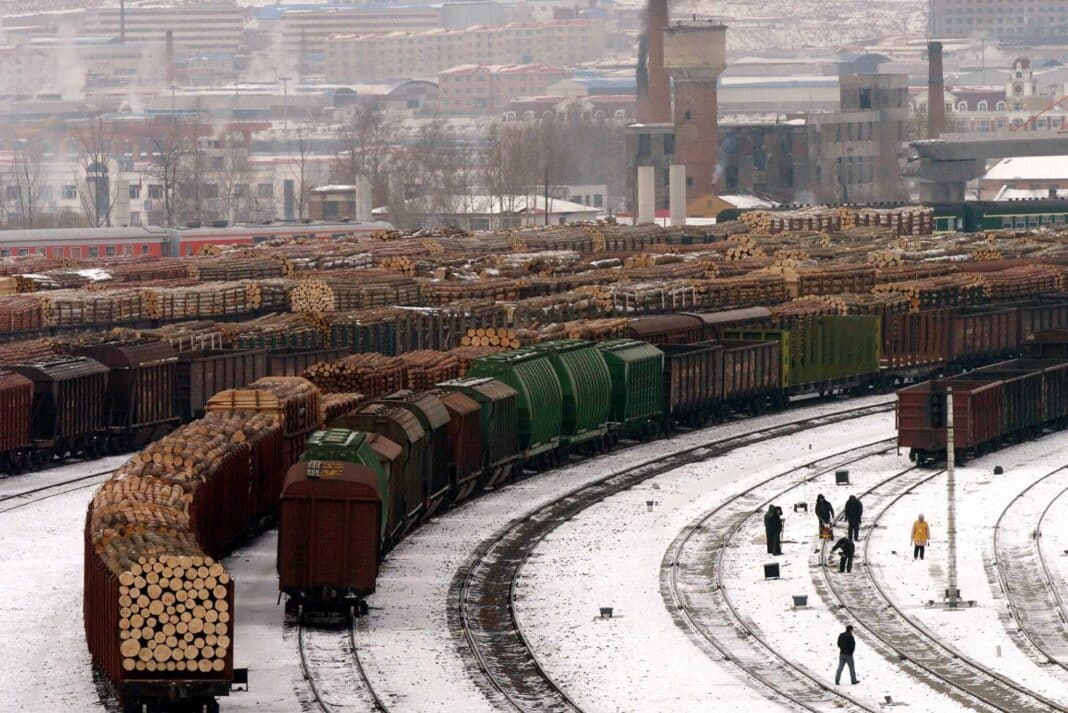Over 250,000 cubic metres of Belarus timber was traded into Eurasian markets last month, with a significant portion then on-traded into the EU and Western markets.
Timber exports from the heavily sanctioned Putin-aligned state have exploded over the past 12 months, with more than 365,000 cubic metres of sawn wood traded into 15 “friendly nations” in the first three months of 2024 alone.
That is according to the government-backed Belarusian Universal Commodity Exchange (BUCE), which reported that Belarus timber production was up eight times over the January to March quarter for 2023, with the total output of Belarussian timber reaching 748,000 cubic metres— including 49% traded into global markets via third-party Eurasian trading ports.
The BUCE is among Eastern Europe’s largest commodity exchange markets. It assists with foreign direct investment into the Belarussian economy. It facilitates the country’s timber trade, metals, agricultural products, and a broad choice of industrial and consumer goods.
According to the BUCE, China, Russia, Azerbaijan, and Uzbekistan remain the largest export markets for Belarusian timber – having successfully replaced traditional markets, including Lithuania, Latvia and Germany.
“Against the background of a favourable situation in key importing countries and primarily in China, about 250,000 cubic meters of sawn timber products were sold to foreign markets last month,” according to the BUCE, adding that Belarus producers were also benefiting from a “positive price trend.”
“For example, compared to the previous quarter, the most demanded saw-trimmed softwood lumber increased in price by 10% on average and is currently traded at $150-160 per cubic metre,” it said.
How Belarus Timber Producers Avoid Western Sanctions
In February, Wood Central revealed that Belarusan timber traders were piling into Azerbaijan and now using the former Soviet state as a trading post to push timbers into the EU and the wider Eurasia region.
At the time, Belarus state media reported that timber was the main contributor to the sanctioned country’s blossoming trade with the satellite state – located on the border of Eastern Europe and Western Asia in the Southern Caucasus.
“Over the past year, more than 301,000 cubic meters of Belarusian timber were sold to the Azerbaijani market, almost six times more than in 2022,” Belaurus media said before continuing that Azerbaijan now ranks second only to China for export trade.
Since early 2022, Western sanctions on Russian and Belarussian trade have limited the export of pulp, paper, and softwood to nine countries: China, Kazakhstan, Belarus, Uzbekistan, Iran, Kyrgyzstan, the United Arab Emirates, and Azerbaijan. Wood Central reports that timber continues to infiltrate global supply chains.
It includes Poland, with Wood Central reporting that Belarus was using Kazakhstan as an entry point to flood the EU with its timber, leaving customs officials flat-footed.
A joint investigation involving the Belarussian Investigative Center, Radio Free Europe, and Polish newspaper Gazeta Wyborcza alleged that Polish imports of timber from Kazakhastan grew from €14 million (pre-war) to more than €68 million last year as part of a €126 million global trade in conflict timber.
“We have documents indicating that Belarus-based companies are exploiting Poland as an entry point by falsifying shipping records to misrepresent Belarusian timber originating from Kazakhstan,” the group said in a joint statement last month.
“A January 2023 customs declaration (for example) bears counterfeit stamps and signatures from Kazakhstani officials, certified pine fence posts as exported from Kazakhsatni to a Polish company,” they said.
“However, the listed supplier denied any financial transactions, calling the documents outright forgeries.”






